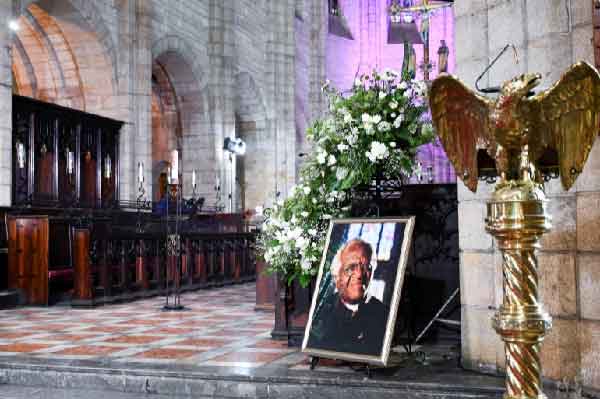 South Africa has bid farewell to Archbishop Desmond Tutu, the last great hero of the struggle against apartheid, in a funeral stripped of pomp but freighted with tears and drenched in rain.
South Africa has bid farewell to Archbishop Desmond Tutu, the last great hero of the struggle against apartheid, in a funeral stripped of pomp but freighted with tears and drenched in rain.
Cape Town.- The funeral started with a hymn and a procession of clerics down the aisle burning incense and carrying candles in the church where Tutu will also be buried on Saturday.
Tutu died last Sunday aged 90, triggering grief among South Africans and tributes from world leaders for a life spent fighting injustice. The first Black Archbishop of Cape Town became an Anglican priest in the early 1960s and was awarded the Nobel prize in 1984 for his non-violent opposition to apartheid.
After South Africa achieved democracy in 1994, the late Nelson Mandela named Tutu to chair the Truth and Reconciliation Commission, a body created to report on human rights violations that took place during apartheid.
Famous for his modesty, Tutu gave instructions for a simple, no-frills ceremony, with a cheap coffin, donations for charity instead of floral tributes, and an eco-friendly cremation. The requiem mass started at 10 a.m. (08:00 GMT) at Cape Town’s St George’s Cathedral where, for years, Tutu used the pulpit to rail against a brutal white minority regime.
Mourners at the intentionally simple ceremony were limited to close friends and family, clergy, and a few international guests, including King Letsie III from neighboring Lesotho. Tutu’s ashes are later due to being interred in a mausoleum inside the cathedral.
President Cyril Ramaphosa, who accorded Tutu a special category funeral, usually designated for presidents and very important people, described the Nobel Peace Prize-winning icon as a man of “great moral stature.” “If we are to understand a global icon to be someone with great moral stature, of exceptional qualities and service to humanity, there can be no doubt it refers to the man we are laying to rest today,” Ramaphosa said.
“Tutu was without question a crusader in the struggle for freedom, justice, equality peace, not only in South Africa … but around the world as well. “[He was] a humble and brave human being who spoke for the oppressed, the downtrodden and the suffering of the world how fitting is it that his parents named him Mpilo when he was born, meaning life.”
Ramaphosa then presented Tutu’s widow, Leah, with South Africa’s six-colored flag, which inspired Tutu to coin the term “rainbow nation” to describe the peaceful coexistence of South Africa’s many population groups after apartheid. “We shared him with the world, and you shared part of the love you had for him with us,” said Tutu’s daughter Naomi, who is also a priest.
“We are thankful that all of you have gathered in your many places, in person or via the wonders of technology, to celebrate daddy’s life this week … We say thank you, daddy, for the many ways you showed us love. For the many ways you challenged us.”
Observers said that the South African president went a step further by acknowledging the archbishop’s criticism of the post-apartheid government’s shortcomings. “This wasn’t a man, Ramaphosa said, that just preached from the pulpit but he was on the ground with the people for various causes, whether it was the racial segregation at the time or even after the dawn of democracy,” Miller said.
South Africa has been marking a week of mourning, culminating with two days of lying in state. Several thousand people, some of whom had traveled across the country, filed past a diminutive rope-handled coffin made of pine, adorned simply by a bunch of carnations.
Under a grey sky and drizzle, mourners were ushered into the cathedral. Rains, according to historian Khaya Ndwandwe “are a blessing” and show that Tutu’s “soul is welcome” to heaven. Mourners included close friends and family, clergy, and guests, including former Irish President Mary Robinson, who is to read a prayer.
Others mourners were Elita, the widow of the last apartheid leader FW de Klerk, who died in November.
Conspicuously absent from the funeral is one of Tutu’s best friends, the Dalai Lama. He failed to travel due to advanced age and COVID restrictions, his representative Ngodup Dorjee told the AFP news agency outside the church.
Tutu’s longtime friend, retired bishop Michael Nuttall, who was Anglican Church dean when Tutu was the archbishop of Cape Town, delivered the sermon.
The two forged a strong relationship, illustrating for many how a white leader could work for a Black leader. Nuttall went on writing a memoir titled Tutu’s Number Two about their friendship. (RHC)